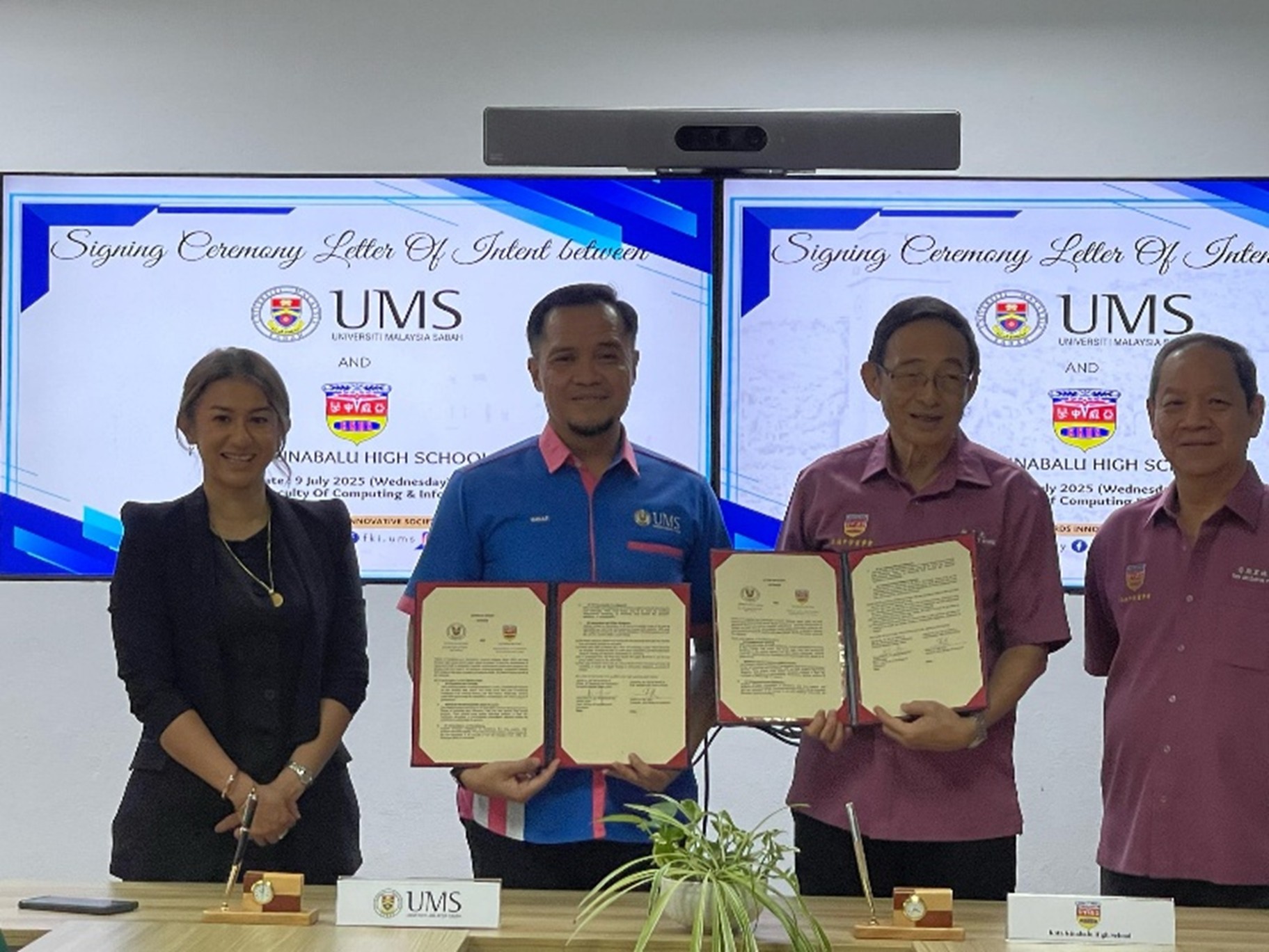 Universiti Malaysia Sabah (UMS), through its Faculty of Computing and Informatics (FKI), has signed a Letter of Intent (LoI) with Kota Kinabalu High School (KKHS) recently to establish a strategic partnership focused on advancing digital and Artificial Intelligence (AI) education and promoting Sustainability Technology.
Universiti Malaysia Sabah (UMS), through its Faculty of Computing and Informatics (FKI), has signed a Letter of Intent (LoI) with Kota Kinabalu High School (KKHS) recently to establish a strategic partnership focused on advancing digital and Artificial Intelligence (AI) education and promoting Sustainability Technology.
The signing ceremony, held at the FKI UMS recently marks the beginning of a collaborative journey toward developing a formal Memorandum of Agreement (MoA), which aims to solidify a long-term partnership in academic training, research, and community development with a shared vision of nurturing digital talent and driving sustainable innovation.
The LoI was formally signed by the Dean of FKI, Associate Professor Ts. Dr. Mohd Hanafi Ahmad Hijazi and Chairman of the KKHS Board of Governors, Datuk Ben Lim Kiat Kong.
Through partnership, both UMS and KKHS will focus on five strategic areas of collaboration aimed at equipping educators and students with future-ready skills and values.
The first area is AI Education and Training, where UMS will conduct a series of digital and AI-related workshops, courses, and training sessions for both KKHS teachers and students, covering the foundational knowledge in AI, machine learning, and data science.
In addition, the partnership will advance Research and Development (R&D) Projects by initiating joint research activities that involve educators and students from both institutions, where the initiatives will explore real-world applications of AI across a diverse range of sectors, including education, tourism, agriculture, healthcare, sports, and environmental conservation.
AI Competitions and Hackathons also will be jointly organized by both institution to encourage creativity, teamwork, and innovation, with the hope that through engaging digital and AI-based challenges, students will develop practical problem-solving skills in a dynamic and collaborative environment.
The fourth strategic area will be touching on the effort to champion AI for Community Development, with digital and AI-driven projects designed to enhance local communities, where the initiatives will focus on areas such as smart cities, environmental monitoring, and improvements to public services including education, tourism, agriculture, healthcare, and transportation.
Lastly, the partnership will promote AI Awareness and Ethics to emphasize ethical innovation and explore AI’s societal impacts by hosting seminars and discussions that highlight the responsible use of artificial intelligence which will be led by UMS experts.
Meanwhile, Ben Lim in his speech during the event, underscored the vital need to future-proof education in an age defined by rapid technological advancement and global challenges.
“This collaboration is a forward-thinking initiative that equips our teachers and students with critical digital skills and a mindset of innovation and responsibility.
“The education must evolve to meet the demands of the 21st century, where AI, automation, and digital transformation are reshaping every industry and aspect of society.
“Traditional classroom models must be complemented with cutting-edge digital learning, hands-on experience, and ethical awareness to cultivate adaptable, tech-savvy individuals who are prepared for tomorrow’s opportunities and challenges,” he said.
Mohd. Hanafi in his closing statement also conveyed his strong confidence that the collaboration between UMS and KKHS is not merely an academic agreement, but a strategic investment in the future of education and society.
“This partnership reflects our shared vision of preparing the next generation for a rapidly evolving digital landscape.
“By investing in AI education and ethical innovation at the secondary school level, we are not only shaping future scientists and engineers, but also responsible global citizens.”
“Aligns with Malaysia’s broader ambition to become a regional leader in AI and digital transformation, early exposure to AI concepts, hands-on learning, and ethical frameworks will empower students to navigate and contribute meaningfully to a world increasingly driven by intelligent systems and data-centric decision-making,” he said.
Mohd. Hanafi also expressed his optimism that the partnership would serve as a model for future collaborations between universities and secondary schools, fostering a culture of lifelong learning, interdisciplinary research, and community-driven impact.
Also attending the event Vice Chairman of the KKHS Board of Governors, Tan Sri Datuk Lim Pau Chang and Adviser Datuk Hiew Thien Choi.
 Universiti Malaysia Sabah (UMS) has charted a new milestone in its innovation journey with the launch of three pioneer start-up companies under the Start-Up and Spin-Off (SUSO) Policy which held recently.
Universiti Malaysia Sabah (UMS) has charted a new milestone in its innovation journey with the launch of three pioneer start-up companies under the Start-Up and Spin-Off (SUSO) Policy which held recently.


 Universiti Malaysia Sabah (UMS) through its International Relations Programme, Faculty of Social Sciences and Humanities (FSSK), hosted a visit by Professor Dr. Omer Kurtbag of Erciyes University, Kayseri, Turkey, from 25 to 29 August 2025.
Universiti Malaysia Sabah (UMS) through its International Relations Programme, Faculty of Social Sciences and Humanities (FSSK), hosted a visit by Professor Dr. Omer Kurtbag of Erciyes University, Kayseri, Turkey, from 25 to 29 August 2025. A total of 61 second-year students from the Civil Engineering Programme, Faculty of Engineering (FKJ), Universiti Malaysia Sabah (UMS) participated in Survey Camp 2025, which was held recently at the Hutan Lipur Kawang Nature Centre, Papar, Sabah.
A total of 61 second-year students from the Civil Engineering Programme, Faculty of Engineering (FKJ), Universiti Malaysia Sabah (UMS) participated in Survey Camp 2025, which was held recently at the Hutan Lipur Kawang Nature Centre, Papar, Sabah. Universiti Malaysia Sabah (UMS), through law lecturer from the Faculty of Social Sciences and Humanities, Marja Azlima Omar, has outlined the importance of two key legal principles, ‘in loco parentis’ and strict liability, which can be applied in addressing school bullying cases.
Universiti Malaysia Sabah (UMS), through law lecturer from the Faculty of Social Sciences and Humanities, Marja Azlima Omar, has outlined the importance of two key legal principles, ‘in loco parentis’ and strict liability, which can be applied in addressing school bullying cases. Universiti Malaysia Sabah (UMS), through its Faculty of Computing and Informatics (FKI), has signed a Letter of Intent (LoI) with Kota Kinabalu High School (KKHS) recently to establish a strategic partnership focused on advancing digital and Artificial Intelligence (AI) education and promoting Sustainability Technology.
Universiti Malaysia Sabah (UMS), through its Faculty of Computing and Informatics (FKI), has signed a Letter of Intent (LoI) with Kota Kinabalu High School (KKHS) recently to establish a strategic partnership focused on advancing digital and Artificial Intelligence (AI) education and promoting Sustainability Technology.